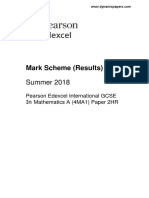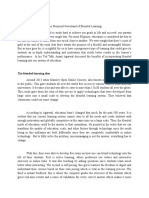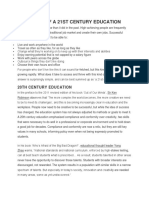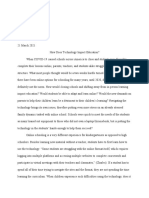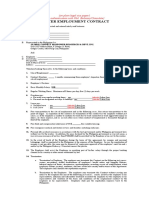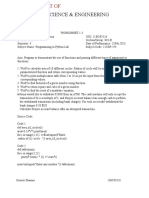From Google To Gugol
From Google To Gugol
Uploaded by
Arvin Antonio OrtizCopyright:
Available Formats
From Google To Gugol
From Google To Gugol
Uploaded by
Arvin Antonio OrtizOriginal Description:
Original Title
Copyright
Available Formats
Share this document
Did you find this document useful?
Is this content inappropriate?
Copyright:
Available Formats
From Google To Gugol
From Google To Gugol
Uploaded by
Arvin Antonio OrtizCopyright:
Available Formats
FROM GOOGLE TO GUGOL*
I once gave a pep talk to my high school students. I told them that they
are luckier than their parents and their grandparents and the parents of
their grandparents. They asked why. I said because they have Google.
Google undeniably makes their lives easier. If the teacher asked them to
look for the capital city of Spain, Google has the answer. If the teacher
asked what the tallest mountain is, Google has the answer. But what if the
teacher asked them to explain the factors of production? If Google doesn’t
have an instant answer, students would give up.
That’s why I also told them that while they have Google, they lack what
the generations before them have—Gugol. A Filipino word, gugol means “to
spend, or to appropriate,” as in, “Gumugol siya ng maraming oras sa pag-
aaral.”
Finally, I told my students that just because they have Google but not
Gugol, that doesn’t mean they cannot have it anymore.
Today’s generation of students is called “Digital Natives,” and the
generation before them, the “Digital Immigrants.” The digital natives are
good at technology, while the digital immigrants struggle with it.
The digital natives find it so easy to make Facebook memes or download
videos from YouTube, while digital immigrants can’t even distinguish right
click from left click. Digital natives are fond of
using #hashtags #in #almost #everything #they #say, while digital
immigrants are more formal in their Facebook posts. And digital natives
speak in acronyms—CTTO (credits to the owner); FO (friendship over);
OMG (oh my God); GGSS (gwapong gwapo/gandang ganda sa sarili)—while
digital immigrants would rather spell them out.
Yet, according to Jeff Degraff, the difference between the two has little to
do with technology. It has more to do with the way each generation views
the world.
Degraff said, “Digital natives view the world horizontally, in equalitarian
terms. Rather than dividing the world into hierarchies, they see everyone
as existing on an equal level. They embrace the benefits of sharing things
and ideas with each other and, in doing so, they cross boundaries. They
are driven by values. For this reason, many of them are distrustful of…
marriage, religion, government.”
Add teachers to the list that digital natives see as their equal, and it
perfectly makes sense why students nowadays talk to teachers like they
talk to friends their age.
On the other hand, according to Degraff, “the culture of digital immigrants
is meritocracy…Digital immigrants are goal oriented…Workaholics are not
an uncommon manifestation of this win at all costs world view.”
Despite our differences, we can still learn from each other. Teachers can
learn from the students how to turn on the computer, upload or download
videos, and a host of other tech-related things. Beyond those trivial
matters, this generation can teach us how “to collaborate across
boundaries, with a variety of people.” In turn, the students can learn from
us the value of Gugol, of spending time in things that matter.
Sometimes, all we need to do is Google. Other times, we have to Gugol.
The best things in life, though, are those we gained by dint of hard work—
excellent grades, prestigious awards, high-paying jobs, or good
relationships
You might also like
- 4MA1 2HR Rms 20180822Document19 pages4MA1 2HR Rms 20180822Annie SinsenNo ratings yet
- Elements of Legal WritingDocument26 pagesElements of Legal WritingArvin Antonio Ortiz100% (2)
- Real Estate Due Diligence - ChecklistDocument1 pageReal Estate Due Diligence - ChecklistArvin Antonio OrtizNo ratings yet
- RDO No. 112 Tagum City Davao Del NorteDocument1,278 pagesRDO No. 112 Tagum City Davao Del NorteArvin Antonio Ortiz100% (1)
- RDO No. 113B - East Davao CityDocument260 pagesRDO No. 113B - East Davao CityPatoy75% (4)
- Instrumentation For Oil and Gas - PrintversionDocument8 pagesInstrumentation For Oil and Gas - PrintversionSANJAYNo ratings yet
- Tackling Google Generation in The Classrooms of TodayDocument3 pagesTackling Google Generation in The Classrooms of TodayDr Dheeraj MehrotraNo ratings yet
- EdTech in The Nigerian FutureDocument4 pagesEdTech in The Nigerian FutureAJNo ratings yet
- My Globalization StoryDocument1 pageMy Globalization StoryAsher DiamanteNo ratings yet
- Education Through Technology The Way To Enhance ItDocument4 pagesEducation Through Technology The Way To Enhance ItAJNo ratings yet
- Life Without GoogleDocument1 pageLife Without GooglePalak JainNo ratings yet
- Digital Immigrants Vs Digital Natives Closing The GapDocument4 pagesDigital Immigrants Vs Digital Natives Closing The GapSammawah DownesNo ratings yet
- Tanmay Singh Rawal Class 10th - EDocument14 pagesTanmay Singh Rawal Class 10th - Ethakurtanmay057No ratings yet
- 5316 Digital Citizenship 2Document7 pages5316 Digital Citizenship 2api-553759916No ratings yet
- Digital Education: (The Philippine Star) - Updated November 27, 2014 - 12:00amDocument1 pageDigital Education: (The Philippine Star) - Updated November 27, 2014 - 12:00amallaurioNo ratings yet
- Alia Formal Reflection22Document6 pagesAlia Formal Reflection22api-274357826No ratings yet
- Text 1Document5 pagesText 1ahmetpltNo ratings yet
- Educational Technology AutosavedDocument8 pagesEducational Technology Autosavedapi-267816884No ratings yet
- Digital Native, Digital Immigrants Digital ImmigrantsDocument5 pagesDigital Native, Digital Immigrants Digital ImmigrantsCarlossluisNo ratings yet
- Abigail: EDIM 508 Unit 1 Summary Posting Media Minds: Students' Use of Media TodayDocument4 pagesAbigail: EDIM 508 Unit 1 Summary Posting Media Minds: Students' Use of Media TodayktitraceNo ratings yet
- A Tsunami of Learners Called Generation ZDocument5 pagesA Tsunami of Learners Called Generation ZChristopher Ryan Isidro AdalemNo ratings yet
- Background Notes - Digital NativesDocument2 pagesBackground Notes - Digital Nativesyeo.junzhongNo ratings yet
- Can One Be A Global TeacherDocument1 pageCan One Be A Global TeacherJulienne KryzzahNo ratings yet
- Digital Natives and Digital ImmigrantsDocument51 pagesDigital Natives and Digital ImmigrantsGammo VargasNo ratings yet
- Reading Response JournalsDocument9 pagesReading Response JournalsCassandra SilvaNo ratings yet
- Project 2Document4 pagesProject 2api-284677421No ratings yet
- The Promised Neverland of Blended LearningDocument3 pagesThe Promised Neverland of Blended LearningCamilleNo ratings yet
- Essay 2 AgDocument3 pagesEssay 2 Agapi-529653050No ratings yet
- 無標題文件 5Document2 pages無標題文件 5Rachel MaNo ratings yet
- GACMagazineDocument52 pagesGACMagazineadegrilloNo ratings yet
- Stelly Final Reflection Week 05Document5 pagesStelly Final Reflection Week 05api-517496771No ratings yet
- Topic 2Document3 pagesTopic 2api-152471603No ratings yet
- Education in The 21ST CenturyDocument8 pagesEducation in The 21ST CenturyMaricel BaltazarNo ratings yet
- Una Práctica Que Recomendamos: ¿Con Qué Pueden Ayudar en Casa Los Chicos Según Su Edad? (En Inglés) - Colegio YorkDocument3 pagesUna Práctica Que Recomendamos: ¿Con Qué Pueden Ayudar en Casa Los Chicos Según Su Edad? (En Inglés) - Colegio YorkAdrian VarelaNo ratings yet
- Google Homework HelperDocument4 pagesGoogle Homework Helpermivemegijup3100% (1)
- InquiryDocument3 pagesInquiryapi-348850669No ratings yet
- LetterDocument4 pagesLetterrajputrajyuvraj7No ratings yet
- Teaching For The New Millennium: Salman KhanDocument4 pagesTeaching For The New Millennium: Salman KhanAyeshaJangdaNo ratings yet
- Edgell KDocument7 pagesEdgell Kapi-471437523No ratings yet
- The Impact of Technology On EducationDocument8 pagesThe Impact of Technology On EducationAnalyn LaridaNo ratings yet
- Eip PaperDocument8 pagesEip Paperapi-252848357No ratings yet
- 15 Characteristics of A 21st-Century Teacher: 1. Learner-Centered Classroom and Personalized InstructionsDocument3 pages15 Characteristics of A 21st-Century Teacher: 1. Learner-Centered Classroom and Personalized InstructionsDiofred LoboNo ratings yet
- Eng - Script SpeechDocument1 pageEng - Script SpeechruunarunaaNo ratings yet
- Calo, Grezza Marla D. Current Trends and Issues 3 4edm Edelec3Document6 pagesCalo, Grezza Marla D. Current Trends and Issues 3 4edm Edelec3may17No ratings yet
- Postman Paper - BatwinisDocument7 pagesPostman Paper - Batwinisapi-354597059No ratings yet
- Debate On Technology's Affect On Children's Well-BeingDocument3 pagesDebate On Technology's Affect On Children's Well-BeingSam TaylorNo ratings yet
- Discovering Educational Technology for Adult LearnersFrom EverandDiscovering Educational Technology for Adult LearnersRating: 5 out of 5 stars5/5 (2)
- Speech - Najwa Salsabila - MASS TBIDocument2 pagesSpeech - Najwa Salsabila - MASS TBIAhmad alamul hudaNo ratings yet
- Digital NativesDocument2 pagesDigital Nativesanamanzano1993No ratings yet
- The Future of Education Is The Web 1Document1 pageThe Future of Education Is The Web 1Allen WanNo ratings yet
- Dudley - 21st Century LearnersDocument3 pagesDudley - 21st Century Learnersapi-294067017No ratings yet
- We Are Living in The 21st CenturyDocument3 pagesWe Are Living in The 21st CenturyCeline Marie Libatique AntonioNo ratings yet
- 5316 Reflection 5 RodriguezDocument4 pages5316 Reflection 5 Rodriguezapi-453439670No ratings yet
- The Value of A 21ST Century EducationDocument8 pagesThe Value of A 21ST Century EducationPrecious AcebucheNo ratings yet
- Protecting Childrens Privacy and Minimizing Their Digital Footprints - Hailey and NateDocument8 pagesProtecting Childrens Privacy and Minimizing Their Digital Footprints - Hailey and Nateapi-747194412No ratings yet
- Document 3Document2 pagesDocument 3ugochukwu.obiokafor10No ratings yet
- Myers 206 Week5Document3 pagesMyers 206 Week5api-272833090No ratings yet
- Wantad 1Document16 pagesWantad 1api-324338651No ratings yet
- Westphalen Lucas Technology PhilosophyDocument4 pagesWestphalen Lucas Technology PhilosophyrachelwestphalenNo ratings yet
- Digital Sabbath ReflectionDocument7 pagesDigital Sabbath Reflectionapi-30764129No ratings yet
- NewsletterDocument1 pageNewsletterapi-278541169No ratings yet
- The Chromebook Infused Classroom: Using Blended Learning to Create Engaging, Student-Centered ClassroomsFrom EverandThe Chromebook Infused Classroom: Using Blended Learning to Create Engaging, Student-Centered ClassroomsNo ratings yet
- The Quill, Greenport High SchoolDocument16 pagesThe Quill, Greenport High SchoolTimesreviewNo ratings yet
- Literacy in Cell Phones Tracy GrijalvaDocument12 pagesLiteracy in Cell Phones Tracy Grijalvaapi-708546657No ratings yet
- Literature ReviewDocument4 pagesLiterature Reviewapi-549248807No ratings yet
- Newsletterformulti ModalityDocument4 pagesNewsletterformulti Modalityapi-263192630No ratings yet
- Citizenship: Junior Partner Galleros, Sanchez & Associates Law FirmDocument29 pagesCitizenship: Junior Partner Galleros, Sanchez & Associates Law FirmArvin Antonio OrtizNo ratings yet
- Data Privacy in Basic EducationDocument35 pagesData Privacy in Basic EducationArvin Antonio OrtizNo ratings yet
- Through Night & DayDocument1 pageThrough Night & DayArvin Antonio Ortiz0% (1)
- RDO NO. 113A West Davao CityDocument325 pagesRDO NO. 113A West Davao CityArvin Antonio Ortiz100% (2)
- Estimated CostsDocument3 pagesEstimated CostsArvin Antonio OrtizNo ratings yet
- Affidavit of DiscrepancyDocument1 pageAffidavit of DiscrepancyArvin Antonio OrtizNo ratings yet
- Malapropis M Run-On FragmentDocument23 pagesMalapropis M Run-On FragmentArvin Antonio OrtizNo ratings yet
- RedundancyDocument13 pagesRedundancyArvin Antonio OrtizNo ratings yet
- HSBC v. CIRDocument11 pagesHSBC v. CIRArvin Antonio OrtizNo ratings yet
- Writing Stages-Writers BlockDocument15 pagesWriting Stages-Writers BlockArvin Antonio OrtizNo ratings yet
- Checklist of Requirements-Building PermitDocument1 pageChecklist of Requirements-Building PermitArvin Antonio OrtizNo ratings yet
- Pimentel v. Executive Sec.Document7 pagesPimentel v. Executive Sec.Arvin Antonio OrtizNo ratings yet
- Affidavit of Support Not For SaleDocument1 pageAffidavit of Support Not For SaleArvin Antonio OrtizNo ratings yet
- Special Power of AttorneyDocument2 pagesSpecial Power of AttorneyArvin Antonio OrtizNo ratings yet
- Master Employment Contract: (On Plain Legal Size Paper) (For Authentication With Phil. Embassy/Consulate)Document2 pagesMaster Employment Contract: (On Plain Legal Size Paper) (For Authentication With Phil. Embassy/Consulate)Arvin Antonio Ortiz100% (1)
- Ano Ang Kuwentong Kaguran MoDocument1 pageAno Ang Kuwentong Kaguran MoArvin Antonio OrtizNo ratings yet
- Saguisag v. OchoaDocument90 pagesSaguisag v. OchoaArvin Antonio OrtizNo ratings yet
- Heroism in The Time of PandemicDocument1 pageHeroism in The Time of PandemicArvin Antonio OrtizNo ratings yet
- Wedding Program FlowDocument1 pageWedding Program FlowArvin Antonio OrtizNo ratings yet
- Concept Paper SDG ForumDocument4 pagesConcept Paper SDG ForumArvin Antonio OrtizNo ratings yet
- Ease of Doing Business in The PhilippinesDocument2 pagesEase of Doing Business in The PhilippinesArvin Antonio OrtizNo ratings yet
- Judicial Affidavit: Page 1 of 6Document6 pagesJudicial Affidavit: Page 1 of 6Arvin Antonio OrtizNo ratings yet
- Binary Representation - Year 7Document2 pagesBinary Representation - Year 7Orlan LumanogNo ratings yet
- GSRTCDocument1 pageGSRTCsolankidilip41442No ratings yet
- Gourav 3Document4 pagesGourav 3YASH CHAUDHARYNo ratings yet
- Java Full CodingDocument133 pagesJava Full Coding727821TUEE038 KARPAGASHIVAKUMAR R.No ratings yet
- LT 165Document16 pagesLT 165whitebriggsNo ratings yet
- Elements of Art and Principles of DesignDocument28 pagesElements of Art and Principles of Designsarbast piro100% (2)
- Prof. A. AcharyaDocument101 pagesProf. A. AcharyaPrashansa AgarwalNo ratings yet
- Environmental Assessment of The Hot-Dip Galvanization ProcessesDocument3 pagesEnvironmental Assessment of The Hot-Dip Galvanization ProcessesArshath FleminNo ratings yet
- From Visual Import : AballinaboxDocument7 pagesFrom Visual Import : AballinaboxhammouNo ratings yet
- Guideline Value of Mahalakshmi NagarDocument3 pagesGuideline Value of Mahalakshmi NagarchandranmuthuswamyNo ratings yet
- WWW - Szegedklima.hu - Hoszivattyu-Hitachi-Katalogus-Hitachi Yutaki Hoszivattyu 2013 en KatalogusDocument92 pagesWWW - Szegedklima.hu - Hoszivattyu-Hitachi-Katalogus-Hitachi Yutaki Hoszivattyu 2013 en Katalogussenthilarasu5No ratings yet
- Pressure Control ValvesDocument40 pagesPressure Control ValvesVivek Vardhan100% (1)
- Educational SupervisionDocument9 pagesEducational SupervisionHapani HarunNo ratings yet
- Keiths Resume 2 1Document2 pagesKeiths Resume 2 1api-686105315No ratings yet
- Ritararenga Antoinette - Lab2Document4 pagesRitararenga Antoinette - Lab2gatete samNo ratings yet
- Mechanical Advantage and EfficiencyDocument18 pagesMechanical Advantage and EfficiencyVinceeNo ratings yet
- ACI Webinar Presentation (Airbiz)Document18 pagesACI Webinar Presentation (Airbiz)Marius GirdeaNo ratings yet
- Benefits of Cold Mix Technology Over Hot Mix Technology in Sustainable Road NetworkDocument7 pagesBenefits of Cold Mix Technology Over Hot Mix Technology in Sustainable Road NetworkAdvanced Research PublicationsNo ratings yet
- Swimming Club Letter and PlanDocument5 pagesSwimming Club Letter and PlanZenia CapalacNo ratings yet
- Face Detection Recognition Report PDFDocument7 pagesFace Detection Recognition Report PDFBushra SaleemNo ratings yet
- Soccer Dribbling Lesson PlanDocument4 pagesSoccer Dribbling Lesson Planapi-277906070No ratings yet
- 2003 06 Toronto Computes!Document46 pages2003 06 Toronto Computes!thecomputerpaperNo ratings yet
- Earth Moving EquipmentDocument5 pagesEarth Moving EquipmentEmmett YoungNo ratings yet
- Maxipro Double Offset Butterfly Valve Nov 2009 LRDocument6 pagesMaxipro Double Offset Butterfly Valve Nov 2009 LRLungisaniNo ratings yet
- Organizational Justice The Sound Investment in OrganizationsDocument9 pagesOrganizational Justice The Sound Investment in OrganizationsMohammad Sohail RashidNo ratings yet
- 1st Preboard Design PDocument13 pages1st Preboard Design PHarf MirandaNo ratings yet
- First Term Exam 1AS RemediationDocument2 pagesFirst Term Exam 1AS RemediationCy LiaNo ratings yet
- Values 2Document2 pagesValues 2Geraldine DelacruzNo ratings yet
